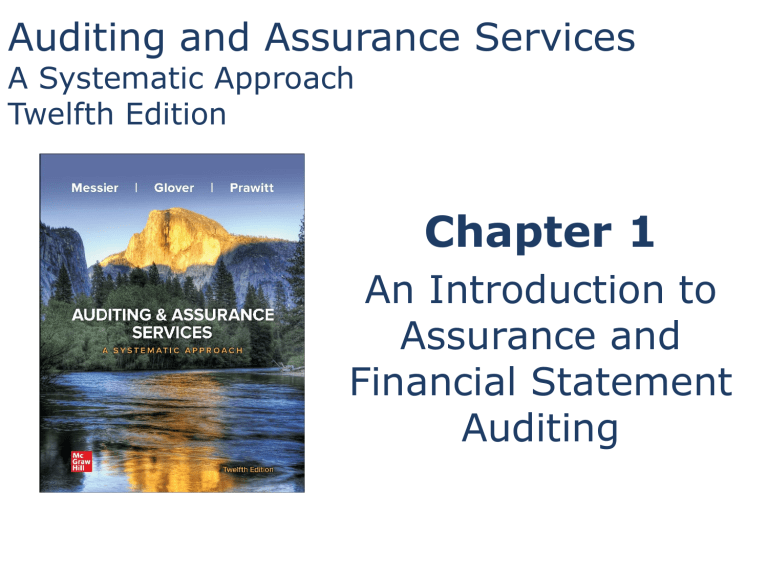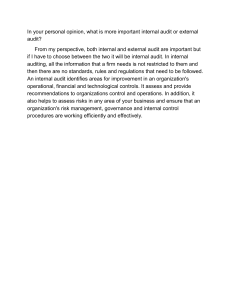
Auditing and Assurance Services A Systematic Approach Twelfth Edition Chapter 1 An Introduction to Assurance and Financial Statement Auditing The Study of Auditing The study of auditing is different from other accounting courses that you have taken in college because … OTHER COURSES • Rules, techniques and computations to prepare and analyze financial information AUDITING • Analytical and logical skills • Much more conceptual in nature Logical, conceptual tools are useful for all business professionals, not just auditors! Financial Accounting Example Bertrand Engineering is a civil engineering firm that specializes in bridge and tunnel construction as well as flood control. On January 1, 2021, Bertrand received a $40,000,000, four-year contract for a flood control project on the Columbia River. Bertrand uses the percentage-of-completion method of revenue recognition. Data regarding the status of this contract at the end of 2021 and 2022 are as follows: Costs incurred during the year Estimated additional costs to complete (as of year-end) Billings during the year Cash collections during the year 2021 $ 4,200,000 30,800,000 2022 $ 7,700,000 22,100,000 3,800,000 2,900,000 6,900,000 7,200,000 REQUIRED: Calculate the revenue to be recognized on this contract for both 2021 and 2022. Auditing Example Why is auditing different? Are you comfortable with the reported numbers? Let’s return to our previous example. Recorded Revenue Audited revenue 2021 $ 4,800,000 $ 4,700,000 Are revenues properly stated? -Yes/No/Maybe 2022 $ 9,200,000 $ 9,000,000 The Demand for Auditing and Assurance How much money do companies spend on an audit? -Examples of some public companies -Apple, Facebook, Bank of America Why would a company spend so much money on an audit? The Role of Auditing Figure 1-1 – Principal-Agent Relationship Overview of the Financial Statement Audit Process Fundamental Concepts in Conducting a Financial Statement Audit Materiality (Chapter 3) Audit Risk (Chapter 4) Evidence (Chapter 5) Materiality The magnitude of an omission or misstatement of accounting information that, in light of surrounding circumstances, makes it probable that the judgment of a reasonable person relying on the information would have been changed or influenced by the omission or misstatement. Would a $1 million misstatement be material? $10 million? $100 million? $1 billion? Yes/No/Maybe Audit Risk Audit risk is the risk that the auditor expresses an inappropriate audit opinion when the financial statements are materially misstated. Auditing standards make it clear that the audit provides only reasonable assurance that the financial statements do not contain material misstatements. What is reasonable assurance? Apple Inc. Example Audit Evidence Regarding Management Assertions Evidence that assists the auditor in evaluating management’s financial statement assertions. 2 important aspects of audit evidence -Sufficiency -Quantity -Appropriateness -Quality (i.e. relevance and reliability) Sampling: Inferences Based on Limited Observations Why do we use sampling in an audit? • Cost/Benefit • Data analytics is changing sampling – Sometimes allows for testing entire populations How does sampling relate to materiality? How does sampling relate to desired level of assurance? Major Phases of the Audit Client acceptance/continuance Preliminary engagement activities Plan the audit Consider and audit internal control Audit business processes and related accounts (e.g., revenue generation) Complete the audit Evaluate results and issue audit report Issue the Audit Report Structure of the Audit Report -Title line – “Independent Registered Public Accounting Firm” -Addressed to – stockholders and board of directors of the company -Opinion on the Financial Statements -Basis for Opinion -Critical Audit Matters -Conclusion – CPA firm signature, year began serving, city/state of office issuing report, and date of the report Types of Audit Reports -Unqualified -Qualified -Adverse -Disclaimer Apple Inc. Example Auditing Demands Logic, Reasoning, and Resourcefulness An auditor needs to understand more than just the accounting concepts and techniques. Auditing is a fundamentally logical process of thinking and reasoning – so use your common sense and reasoning skills! As you learn new auditing concepts, take some time to understand the underlying logic and how the concepts interrelate with other concepts. Being a good auditor sometimes requires imagination and innovation. Understanding audit concepts is useful for all business professionals, consultants, etc.!

